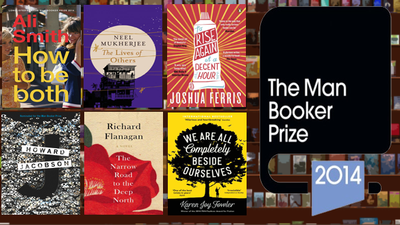A prize every time
The winner of this year’s Man Booker prize will be announced next Tuesday. Those prone to a flutter might find their way to the website Oddschecker (“your best bet”), where the shortlist is ranked. Currently Neel Mukherjee is in the lead with The Lives of Others followed by Richard Flanagan's The Narrow Road to the Deep North.
The professional gambler would do well to look beyond Oddschecker to the TLS for some carefully considered reviews of the shortlist (all of which have been made publicly available in full, through the links below) because the TLS has got it right before – not always, but often enough. . . .
Take the issue of May 15, 1981, when Valentine Cunningham wrote:
What makes Midnight’s Children so extraordinarily important, and moreover (for literary importance isn’t always matched by a fetching readability) what makes it so vertiginously exciting a reading experience, is the way it takes in not just the whole apple cart of India and the problem of being a novel about India but also, and this with the unflagging zest of a Tristram Shandy, the business of being a novel at all.
The Booker judges subsequently agreed; not once, but twice.
And here is Oliver Reynolds on Graham Swift, in the TLS of January 19, 1996:
Last Orders is his finest book to date; emotionally charged and technically superb, it is a wonderful example of the novel’s power to resolve the wavering meanings of the life we all share into a definite focus, one where the clarity with which things are seen renders them precious. Swift’s central strength as a writer is his integrity . . .
Dear reader, he won.
But this is Barbara Hardy reviewing the soon-to-be Booker Prize winner of 1984, Anita Brookner’s Hotel du Lac:
The novel is as amiable as the heroine, though its charm seems drier. The style, at its best in dialogue, can be sharp and fast. It is not so good on emotional narration.
And here is the TLS on the very first winner, P. H. Newby’s Something to Answer For, back in 1968, when reviewers were anonymous:
Mr. Newby’s novel remains rather on the level of brilliantly resourceful entertainment.
The TLS reviewer may not always align with the sentiments of the judges. But, like the judges, the reviewer has rooted to the base of each book on the shortlist, expanding the scope of its questions, and pursuing the offered pathways through it to their sometimes logical conclusions.
While we are not party to the panels’ digressions and arguments we can follow those of the reviewer and embrace, disagree or place our informed bets from there.
So, without further ado we present the TLS on this year's Man Booker shortlist:
Kate Webb reviewed Ali Smith’s How to Be Both:
On Karen Joy Fowler’s We Are All Completely Beside Ourselves, Alan Murrin found that:
On Neel Mukherjee’s The Lives Of Others, Alex Peake-Tomkinson wrote:
Bharat Tandon reviewed Howard Jacobson's J:
Ben Eastham on To Rise Again at a Decent Hour by Joshua Ferris:
Craig Raine reviewed Richard Flanagan’s The Narrow Road to the Deep North:
Now – place your bets . . .
Peter Stothard's Blog
- Peter Stothard's profile
- 30 followers




